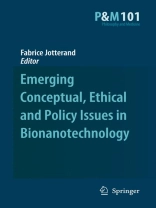Nanobiotechnology is the convergence of existing and new biotechnology with the 1 ability to manipulate matter at or near the molecular level. This ability to manipulate matter on a scale of 100 nanometers (nm) or less is what constitutes the nanotechnology revolution occurring today, the potentially vast economic and social implications of which are yet to be fully understood (Royal Society, 2004). The most immediate way to understand the implications of nanobiotechnology for ethics is to consider the real life concerns of communities that are mobilizing within civil society. The conflicts and ethical debates surrounding nanotechnology will, almost by definition, emerge on the fault lines between different civil society actors, researchers and financial interests associated with nanobiotechnology, as well as (potentially) government regulators. These fault lines are all reflected within the concerns (as expressed d- cursively) of the communities mobilizing. This chapter will explore converging d- courses regarding converging technologies. Converging Technologies (CT) are already a familiar theme in the next gene- tion of biotechnology, nanotechnology, pharmacogenomics and proteomics research 2 and development. Nanobiotechnology means that previously separate disciplines (IT, physics, chemistry, and biology) are merging and converging to create new applications and even new life forms through converged technological platforms. Schummer (2004), and Glimell and Fogelberg (2003, p. 43), note the predominance of interdisciplinarity as a core theme of nano-discourse.
表中的内容
Beyond Feasibility: Why Ethics Is Important for Bionanotechnology.- Knowledge Production in Nanotechnoscience.- The World View of Nanotechnology – Philosophical Reflections.- Nanomachine: Technological Concept or Metaphor?.- No Future for Nanotechnology? Historical Development vs. Global Expansion.- Ethics and (Bio)Nanotechnology.- Bionanotechnology: A New Challenge for Ethical Reflection?.- Nanoparticles: Risk Management and the Precautionary Principle.- Anticipating the Unknown: The Ethics of Nanotechnology.- Applications of Nanotechnology in the Biomedical Sciences: Small Materials, Big Impacts, and Unknown Consequences.- Public Policy and (Bio)Nanotechnology.- Nanobiotechnology and Ethics: Converging Civil Society Discourses.- Allotropes of Fieldwork in Nanotechnology.- Law, Regulation and the Medical Use of Nanotechnology.- Human Enhancement and (Bio)Nanotechnology.- Stage Two Enhancements.- Nanotechnology, the Body and the Mind.- Nanotechnology and Human Flourishing: Toward a Framework for Assessing Radical Human Enhancements.












